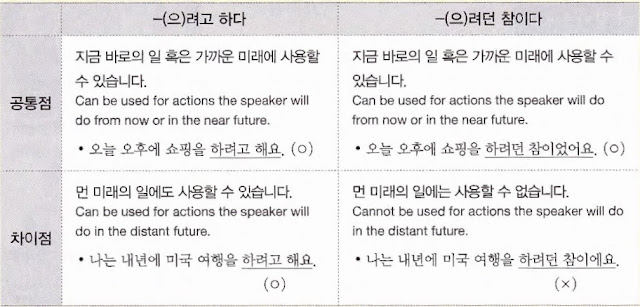가: 저 영화가 재미있다고 하는데 저 영화를 볼래요?
People say that movie is interesting, so do you want to see it?
나: 좋아요. 그렇지 않아도 나도 보려던 참이 었어요.
Sounds good. Even if you hadn’t asked, I had been planning to see it anyway.
가: 자야 씨, 뭘 하고 있어요?
Jaya, what are you doing?
나: 배가 고파서 라면을 끓이려던 참인데 같이 먹을래요?
I was just about to cook some noodles. Do you want to have some with me?
This expression is used to express the fact that not only had the speaker been intending to do the very thing the other person is suggesting, but that he or she was either just about to do it at that very moment or intended to do so very soon. It can only be used with verbs.
 가: 얼굴 표정이 왜 그래요? Why such a (surprised) face?
가: 얼굴 표정이 왜 그래요? Why such a (surprised) face?
나: 피곤해서 잠깐 쉬려던 참인데 사장님이 들어오셔서 당황해서 그래요.
I was tired and about to take a break, but the company president came in, and I was taken by surprise.
가: 돈을 찾아야 되는데 너무 바빠서 은행에 갈 시간이 없어요.
I need to withdraw some money, but I’m so busy that I can’t get to the bank.
나: 그래요? 제가 지금 은행에 가려던 참인데 찾아다 드릴까요?
Really? I was just about to go to the bank, so shall I withdraw some money for you?
가: 수영 씨 뭐 하고 있어요?
What are you doing, Suyeong?
나: 커피를 마시려던 참이었는데 같이 마실래요?
I was just about to have some coffee, so would you like to have some with me?
1. While both -(으)려던 참이다 and -(으)려던 참이었다 are acceptable forms of this expression, -(으)려던 참이다 is used to indicate that the speaker was just about to do the action at that very minute, while -(으)려던 참이었다 is used to indicate that the speaker had already been intending to do the action.
① 지금 그 책을 사려던 참이에요.
② 그 책을 사려던 참이었어요.
Here, ① means that the speaker was just about to buy the book at that very moment while (2) means that the speaker had been planning to buy the book from before the time of the conversation.
2. This expression can be used along with phrases such as 마침, 그렇지 않아도, and 안 그래도 when responding to someone who has suggested doing something that the speaker had already intended to do.
가: 같이 식사할래요?
나: 마침 밥을 먹으려던 참이 었어요.
안 그래도 밥을 먹으려던 참이에요.
그렇지 않아도 밥을 먹으려던 참이 었어요.
3. This expression cannot be used with the future tense.
• 은행에 환전하러 가려던 참일 거예요. (X)
->은행에 환전하러 가려던 참이었어요. (〇)
->은행에 환전하러 가려던 참이에요. (〇)
4. When used at the end of a clause that is followed by another clause in the same sentence, the form -(으)려던 참에 can also be used.
• 내가 전화를 하려던 참에 어머니가 전화를 하셨어요.
When I was about to make a phone call to my mother, I got a phone call from her.
The forms -(으)려고 하다 and -(으)려던 참이다 have the following differences.

>> You can click on the title of each grammar below to learn about the other grammar which also expresses ‘Resolution and Intent’:
01 -(으)ㄹ까 하다
02 -고자
03 -(으)려던 참이다
04 -(으)ㄹ 겸 -(으)ㄹ 겸
05 -아/어야지요
>> Full of Intermediate grammar: Click here

